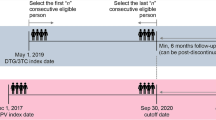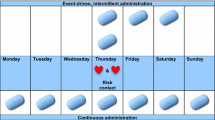Abstract
Highly active antiretroviral therapy (HAART) requires strict adherence to achieve optimal clinical and survival benefits. A study was done to explore the factors affecting HAART adherence among HIV positive adults by reviewing routinely collected patient information in the Centre for the AIDS Programme of Research in South Africa’s (CAPRISA) AIDS Treatment Programme. Records of 688 patients enrolled between 2004 and 2006 were analysed. Patients were considered adherent if they had taken at least 95% of their prescribed drugs. Generalized estimating equations were used to analyse the data. The results showed that HAART adherence increased over time, however, the rate of increase differed by some of the socio-demographic and behavioural characteristics of the patients. For instance, HAART adherence increased in both urban and rural treatment sites over time, but the rate of increase was higher in the rural site. This helped identify sub-populations, such as the urban population, that required ongoing adherence counseling.



Similar content being viewed by others

References
Hogg RS, Heath KV, Yip B, et al. Improved survival among HIV-infected individuals following initiation of antiretroviral therapy. JAMA. 1998;279(6):450–4.
Mocroft A, Ledergerber B, Katlama C, et al. Decline in the AIDS and death rates in the EuroSIDA study: an observational study. Lancet. 2003;362(9377):22–9.
Nachega JB, Stein DM, Lehman DA, et al. Adherence to antiretroviral therapy in HIV-infected adults in Soweto, South Africa. AIDS Res Hum Retroviruses. 2004;20(10):1053–6.
Paterson DL, Swindells S, Mohr J, et al. Adherence to protease inhibitor therapy and outcomes in patients with HIV infection. Ann Intern Med. 2000;133(1):21–30.
Bangsberg DR, Perry S, Charlebois ED, et al. Non-adherence to highly active antiretroviral therapy predicts progression to AIDS. AIDS. 2001;15(9):1181–3.
Knobel H, Guelar A, Valldecillo G, et al. Response to highly active antiretroviral therapy in HIV-infected patients aged 60 years or older after 24 months follow-up. AIDS. 2001;15(12):1591–3.
Chesney MA. Factors affecting adherence to antiretroviral therapy. Clin Infect Dis. 2000;30(Suppl 2):S171–6.
Ferguson TF, Stewart KE, Funkhouser E, Tolson J, Westfall AO, Saag MS. Patient-perceived barriers to antiretroviral adherence: associations with race. AIDS Care. 2002;14(5):607–17.
Murphy DA, Marelich WD, Hoffman D, Steers WN. Predictors of antiretroviral adherence. AIDS Care. 2004;16(4):471–84.
Penedo FJ, Gonzalez JS, Dahn JR, et al. Personality, quality of life and HAART adherence among men and women living with HIV/AIDS. J Psychosom Res. 2003;54(3):271–8.
Roca B, Lapuebla C, Vidal-Tegedor B. HAART with didanosine once versus twice daily: adherence and efficacy. Int J Infect Dis. 2005;9(4):195–200.
Laniece I, Ciss M, Desclaux A, et al. Adherence to HAART and its principal determinants in a cohort of Senegalese adults. AIDS. 2003;17(Suppl 3):S103–8.
Kleeberger CA, Phair JP, Strathdee SA, Detels R, Kingsley L, Jacobson LP. Determinants of heterogeneous adherence to HIV-antiretroviral therapies in the Multicenter AIDS Cohort Study. J Acquir Immune Defic Syndr. 2001;26(1):82–92.
Mohammed H, Kieltyka L, Richardson-Alston G, et al. Adherence to HAART among HIV-infected persons in rural Louisiana. AIDS Patient Care STDS. 2004;18(5):289–96.
Ammassari A, Trotta MP, Murri R, et al. Correlates and predictors of adherence to highly active antiretroviral therapy: overview of published literature. J Acquir Immune Defic Syndr. 2002;31(Suppl 3):S123–7.
Amberbir A, Woldemichael K, Getachew S, Girma B, Deribe K. Predictors of adherence to antiretroviral therapy among HIV-infected persons: a prospective study in Southwest Ethiopia. BMC Public Health. 2008;8:265.
Bangsberg D, Emenyonu N, Andia I, et al. No decline in high levels of electronic pill cap, unannounced home pill count, and patient-reported adherence to free ARV therapy over 12 months in rural Uganda. In: 15th conference on retroviruses and opportunistic infections. Boston, Massachusetts, 3–6 Feb 2008 [abstract no. 801]. http://www.retroconference.org/2008/index.asp. Accessed 4 Feb 2010.
Byakika-Tusiime J, Oyugi JH, Tumwikirize WA, Katabira ET, Mugyenyi PN, Bangsberg DR. Adherence to HIV antiretroviral therapy in HIV+ Ugandan patients purchasing therapy. Int J STD AIDS. 2005;16(1):38–41.
Muyingo SK, Walker AS, Reid A, et al. Patterns of individual and population-level adherence to antiretroviral therapy and risk factors for poor adherence in the first year of the DART trial in Uganda and Zimbabwe. J Acquir Immune Defic Syndr. 2008;48(4):468–75.
Orrell C, Bangsberg DR, Badri M, Wood R. Adherence is not a barrier to successful antiretroviral therapy in South Africa. AIDS. 2003;17(9):1369–75.
Etard JF, Laniece I, Fall MB, et al. A 84-month follow up of adherence to HAART in a cohort of adult Senegalese patients. Trop Med Int Health. 2007;12(10):1191–8.
Laurent C, Diakhate N, Gueye NF, et al. The Senegalese government’s highly active antiretroviral therapy initiative: an 18-month follow-up study. AIDS. 2002;16(10):1363–70.
Iliyasu Z, Kabir M, Abubakar IS, Babashani M, Zubair ZA. Compliance to antiretroviral therapy among AIDS patients in Aminu Kano Teaching Hospital, Kano, Nigeria. Niger J Med. 2005;14(3):290–4.
Weiser S, Wolfe W, Bangsberg D, et al. Barriers to antiretroviral adherence for patients living with HIV infection and AIDS in Botswana. J Acquir Immune Defic Syndr. 2003;34(3):281–8.
Maqutu D, Zewotir T, North D, Naidoo K, Grobler A. Factors affecting early adherence to antiretroviral therapy amongst the HIV positive adults in South Africa. In: 50th annual conference of the South African statistical association, 29 Oct–2 Nov 2007. Johannesburg, South Africa.
South African National Department of Health. National antiretroviral treatment guidelines. 1st ed. (2004). http://www.hst.org.za/uploads/files/sa_ART_gudelines1.pdf/. Accessed 7 May 2009.
Littell RC, Milliken GA, Stroup WW, Wolfinger DR, Schabenberger O. SAS system for mixed models. 2nd ed. Cary, NC: SAS Institute Inc; 1999.
Milliken GA, Johnson E. Analysis of messy data. New York: Chapman & Hall/CRC; 2002.
Agresti A. Categorical data analysis. 2nd ed. New York: Wiley; 2002.
Liang K-Y, Zeger S. Longitudinal data analysis using generalized linear models. Biometrika. 1986;73:13–22.
Pan W. Akaike’s information criterion in generalized estimating equations. Biometrics. 2001;57:120–5.
Hedeker D, Gibbons R. Longitudinal data analysis. New York: Wiley; 2006.
Rubin DB. Inference and missing data. Biometrika. 1976;63:581–92.
Little RJA, Rubin DB. Statistical analysis with missing data. 2nd ed. New York: Wiley; 2002.
Fong OW, Ho CF, Fung LY, et al. Determinants of adherence to highly active antiretroviral therapy (HAART) in Chinese HIV/AIDS patients. HIV Med. 2003;4(2):133–8.
Haubrich RH, Little SJ, Currier JS, et al. The value of patient-reported adherence to antiretroviral therapy in predicting virologic and immunologic response California Collaborative Treatment Group. AIDS. 1999;13(9):1099–107.
Berg KM, Demas PA, Howard AA, Schoenbaum EE, Gourevitch MN, Arnsten JH. Gender differences in factors associated with adherence to antiretroviral therapy. J Gen Intern Med. 2004;19(11):1111–7.
Skhosana N, Struthers H, Gray G, McIntyre J. HIV disclosure and other factors that impact on adherence to antiretroviral therapy: the case of Soweto, South Africa. AJAR. 2006;5(1):17–26.
Harvey KM, Carrington D, Duncan J, et al. Evaluation of adherence to highly active antiretroviral therapy in adults in Jamaica. West Indian Med J. 2008;57(3):293–7.
Birbeck GL, Chomba E, Kvalsund M, et al. Antiretroviral adherence in rural Zambia: the first year of treatment availability. Am J Trop Med Hyg. 2009;80(4):669–74.
Williams A, Friedland G. Adherence, compliance, and HAART. AIDS Clin Care. 1997;9(7):51–4, 8.
Godin G, Cote J, Naccache H, Lambert LD, Trottier S. Prediction of adherence to antiretroviral therapy: a one-year longitudinal study. AIDS Care. 2005;17(4):493–504.
Bartlett JA. Addressing the challenges of adherence. J Acquir Immune Defic Syndr. 2002;29(Suppl 1):S2–10.
Ickovics JR, Meade CS. Adherence to HAART among patients with HIV: breakthroughs and barriers. AIDS Care. 2002;14(3):309–18.
Abel E, Painter L. Factors that influence adherence to HIV medications: perceptions of women and health care providers. J Assoc Nurses AIDS Care. 2003;14(4):61–9.
Nachega JB, Hislop M, Dowdy DW, Chaisson RE, Regensberg L, Maartens G. Adherence to nonnucleoside reverse transcriptase inhibitor-based HIV therapy and virologic outcomes. Ann Intern Med. 2007;146(8):564–73.
Osterberg L, Blaschke T. Adherence to medication. N Engl J Med. 2005;353(5):487–97.
Chang LW, Kagaayi J, Nakigozi G, et al. Telecommunications and health Care: an HIV/AIDS warmline for communication and consultation in Rakai, Uganda. J Int Assoc Physicians AIDS Care (Chic Ill). 2008;7(3):130–2.
Bangsberg DR, Hecht FM, Charlebois ED, et al. Adherence to protease inhibitors, HIV-1 viral load, and development of drug resistance in an indigent population. AIDS. 2000;14(4):357–66.
Acknowledgments
CAPRISA was established in 2002 through a Comprehensive International Program of Research on AIDS (CIPRA) grant (AI51794) from the US National Institutes of Health (NIH), as a multi-institutional collaboration, incorporated as an independent non-profit AIDS Research Organization. The NIH funded the development of the research infrastructure, including the data management, laboratory and pharmacy cores established through the CIPRA grant. The US President’s Emergency Plan for AIDS Relief (PEPfAR) grant (1U2GPS001350) funded the care of all the patients in the CAT Programme. Dikokole Maqutu was supported by and Anneke Grobler received career development support from the Columbia University-Southern African Fogarty AIDS International Training and Research Programme (AITRP) funded by the Fogarty International Center, National Institutes of Health (Grant # D43TW00231). We gratefully acknowledge the patients in the CAT Programme. We also thank all the staff who worked on the CAT Programme, treating patients and helped in the data collection. Special thanks to the pharmacists for collection of pill count data.
Author information
Authors and Affiliations
Corresponding author
Rights and permissions
About this article
Cite this article
Maqutu, D., Zewotir, T., North, D. et al. Determinants of Optimal Adherence Over Time to Antiretroviral Therapy Amongst HIV Positive Adults in South Africa: A Longitudinal Study. AIDS Behav 15, 1465–1474 (2011). https://doi.org/10.1007/s10461-010-9688-x
Published:
Issue Date:
DOI: https://doi.org/10.1007/s10461-010-9688-x



